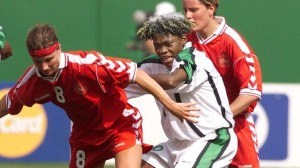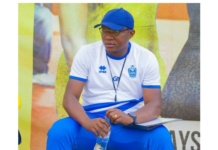One of the first stars of women’s football in Africa, Mercy Akide-Udoh was a trailblazer in more ways than one. An exciting attacking player, she starred for Nigeria in three FIFA Women’s World Cups™, two Olympic Football Tournaments and won three African titles with the Super Falcons.
She was named by CAF as the first African Women’s Footballer of the Year in 2002 and was appointed an Ambassador for women’s football by FIFA in 2005. She came to the United States to play in the now-defunct WUSA for its inaugural season, was named MVP of the W-League in leading Hampton Roads to the title in 2003, and she remained in the USA to coach young girls since retiring
She talked with FIFA.com recently about her passion for football and for giving back using the sport.
FIFA.com: Did you suffer from discrimination as a young woman playing football?
Mercy Akide-Udoh: Not me, but the players in 1991 [at the inaugural FIFA Women’s World Cup] broke the barrier, and then me and others came in ’95. And people in my life really supported me. I had two brothers that always encouraged me to play with them and their friends on the street. I did have a couple of friends whose parents did not want them to keep playing or have anything to do with soccer because they felt like it was a men’s game. And they were very good players, better than me, but because they didn’t get that support, they had to quit. The only problem I had was people would say about me ‘oh look at her, she looks like a boy, she’s not a girl’. I was fit and muscular and like a tomboy, so people would talk about me, but I didn’t care.
Do you think the emergence of women’s football was part of a larger social change, and why do you think Nigeria was at the forefront of that in Africa?
Number one: Nigeria is a football country. We love football, and we believe anyone who loves the game can play the game. People saw we could play, so there was encouragement. Then it became women helping women to feel good about themselves, learning that they can do anything they put their minds to. And so now you have more women in government. Before you didn’t have that. Women now are trying to not just be housewives. They might still care for their home and their children, but they realise they can do more if they want.
And women’s football is catching up across the continent.
All of the teams are trying to beat Nigeria, and they are all growing and focusing on the girls. That can only help the World Cup. In Africa, there are many different cultures. We have Muslims and Christians, and they all love the game. There are Muslims who cover their face and still kick the ball. That’s the love of the game. More women are putting in energy and time to make football a point for young girls to play.
What did it mean to you to be one of the first recognised African women playing football at a high level?
I love the game, and so whenever any games were on I always watched them. They were men’s games, but then when the girls started to play I always dreamed and thought I could become a professional player. I’m grateful I achieved that, and then I said to myself ‘I can do more’. I am so passionate about the game and wanted to give back with the talent that I had, so that’s how I got to coaching.
And you have been coaching in the USA since you stopped playing.
Little kids have looked up to me as a role model, and I can teach them – not just about soccer but about all aspects of life. I’m a mom too, so I understand what a kid needs. I always knew someday I would go back home, but I felt like I had a lot to share here and there was more opportunity for me to get experience. In Nigeria, we have talent but sometimes we don’t work to develop it. I would like to help the Federation with ideas on improving the standard of the women’s league because right now it’s in a bad state.
How else are you thinking about helping Nigerian women’s football?
I’ll be trying to help young girls earn scholarships to US colleges. That’s how I got my big break, and the time is right for me to look to help others to achieve their dreams. Starting this summer when I go back home, I’m starting a program called Play2Learn where I will run camps for girls in high schools in Nigeriaand pick those who can really play, and also have the right educational qualifications for recommendation to coaches. It will help fill a need for both sides as the schools need talented players, and the players get a chance to get an education while playing the game. Hopefully, with time, I can spread it to the rest of Africa.
You have been mentioned as a possible future coach of the Nigerian national team as well. Is that on your radar?
I hope some day I can coach the national team. That’s my passion. There are things we are lacking, and I want to go back and help my country with my experience playing and coaching. I still have that fire in me.
There was controversy a few years ago when disparaging remarks were made about homosexuality. What did you make of that?
For me, I don’t know what that was all about. After coaching and as an ex-player, with friends on my teams, I didn’t see that stuff or know anything about it. I don’t go into people’s business. It’s their life. I cannot tell you not to go and get married, or tell you to go with this person or not. I’m not in a place to judge or control anybody. You are there to play soccer, and that’s all.
Did you ever suffer any other kind of discrimination?
Not really. The only thing I had a problem with was that back home we’re not outspoken, and if you don’t relate to your coach sometimes they feel like you’re ignorant or not paying attention. It’s hard for Africans to come to a different culture and start talking and feel like they have some control. It’s how we treat older people: we don’t come talk to you unless you come talk to us. But then I started learning that people were just different. I used to take it wrong, but not anymore because I realised that they just don’t know my culture or where I’m coming from.









